Exploring the Significance of Islamic Finance for Global Development
VerifiedAdded on 2021/04/17
|9
|2059
|109
Essay
AI Summary
This essay discusses the importance of Islamic Finance in the current global fiscal structure and its potential to redefine international financial markets. It highlights the rapid expansion of the Islamic financial industry, its role in supporting global expansion (including in non-Muslim nations), and its potential to address poverty and improve communal wealth. The essay emphasizes that Islamic finance promotes risk-sharing, connects the financial sector with the real economy, and focuses on financial inclusion and social welfare. It also touches upon the involvement of institutions like the World Bank in promoting Islamic finance and its resilience during international financial crises. The growth factors of Islamic finance are also examined, including the impact of political, socioeconomic factors, and the increasing oil wealth in Gulf nations. The essay concludes that the future of Islamic finance depends on its ability to evolve independently and potentially reshape current financial structures.
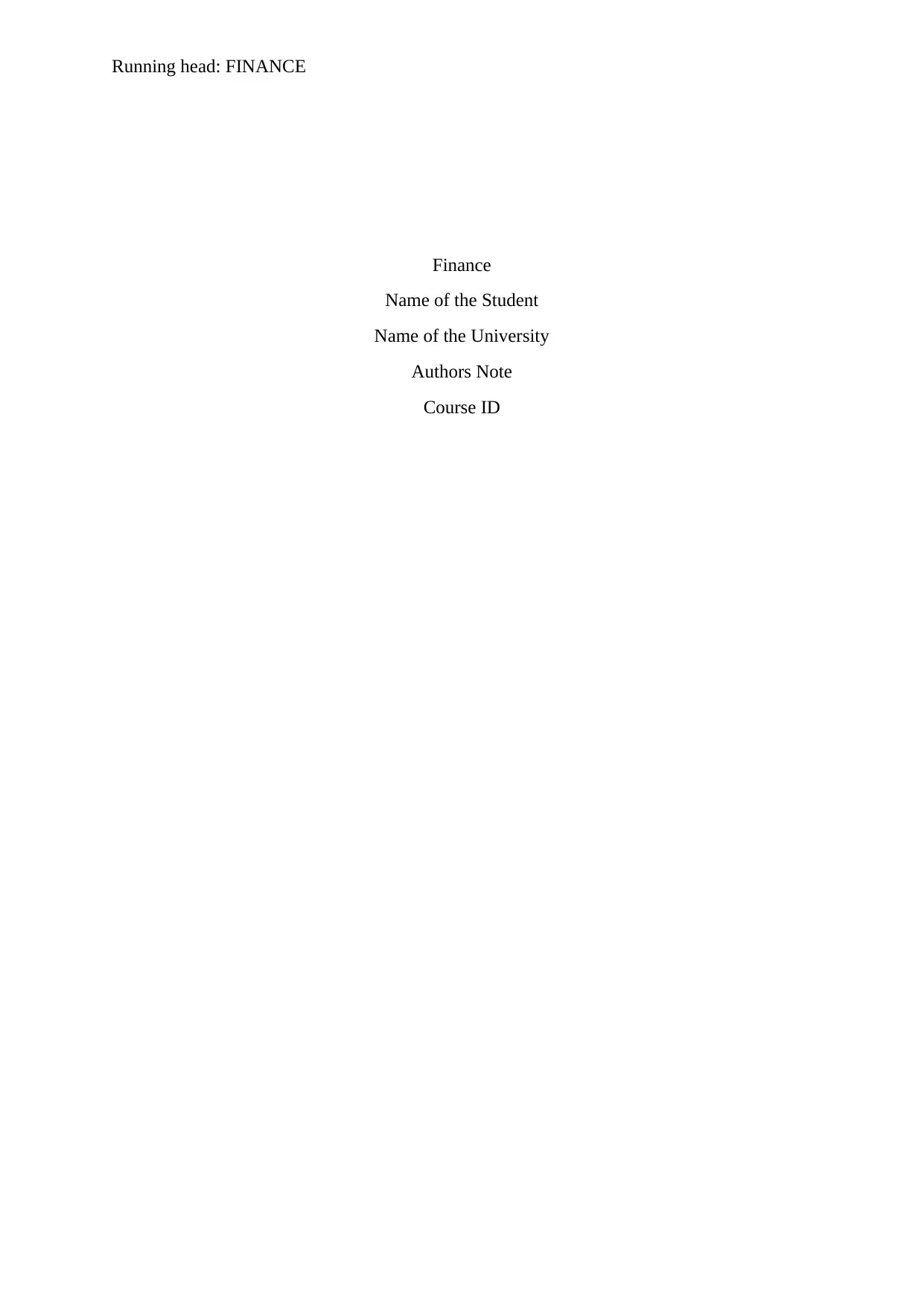
Running head: FINANCE
Finance
Name of the Student
Name of the University
Authors Note
Course ID
Finance
Name of the Student
Name of the University
Authors Note
Course ID
Paraphrase This Document
Need a fresh take? Get an instant paraphrase of this document with our AI Paraphraser
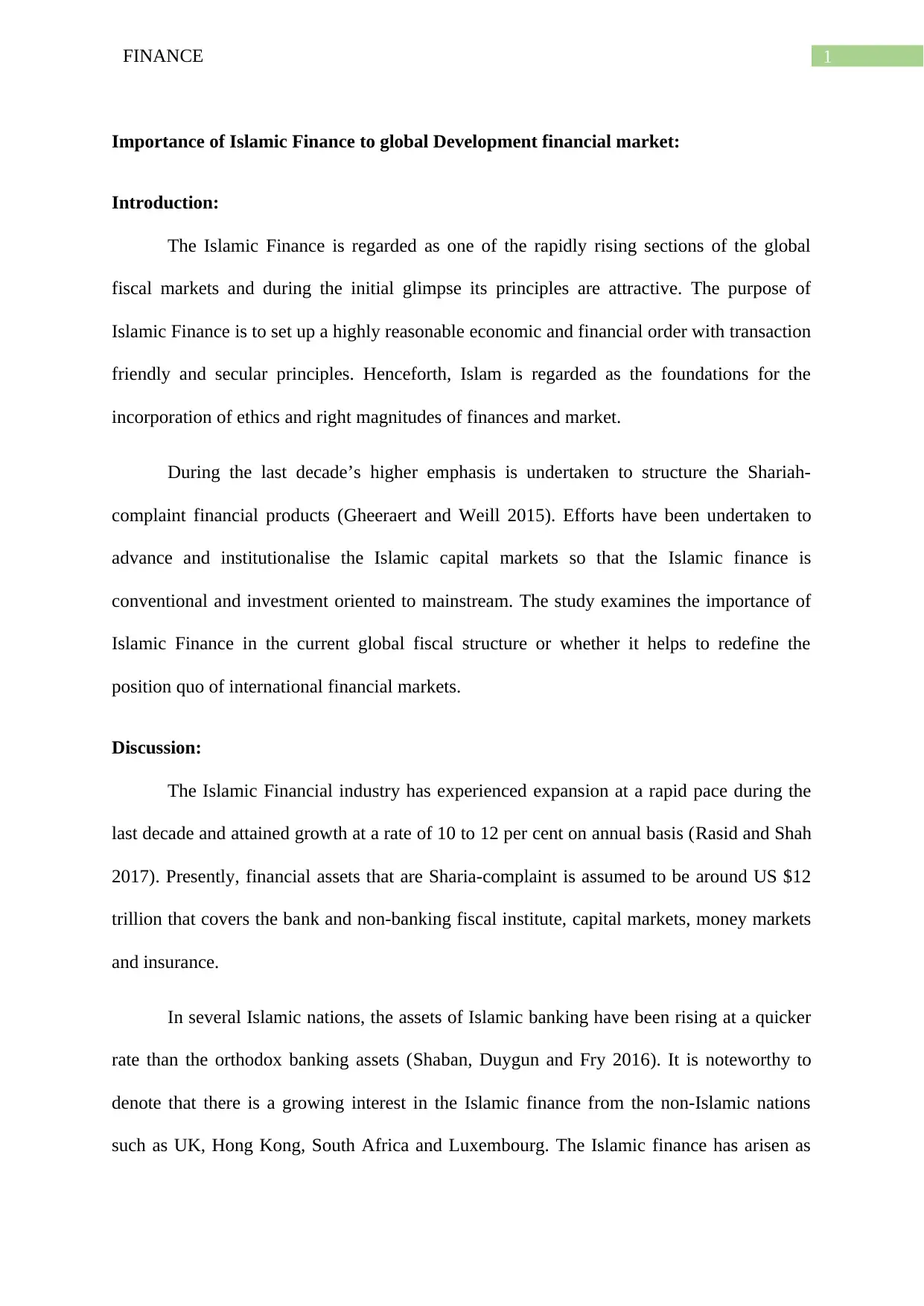
1FINANCE
Importance of Islamic Finance to global Development financial market:
Introduction:
The Islamic Finance is regarded as one of the rapidly rising sections of the global
fiscal markets and during the initial glimpse its principles are attractive. The purpose of
Islamic Finance is to set up a highly reasonable economic and financial order with transaction
friendly and secular principles. Henceforth, Islam is regarded as the foundations for the
incorporation of ethics and right magnitudes of finances and market.
During the last decade’s higher emphasis is undertaken to structure the Shariah-
complaint financial products (Gheeraert and Weill 2015). Efforts have been undertaken to
advance and institutionalise the Islamic capital markets so that the Islamic finance is
conventional and investment oriented to mainstream. The study examines the importance of
Islamic Finance in the current global fiscal structure or whether it helps to redefine the
position quo of international financial markets.
Discussion:
The Islamic Financial industry has experienced expansion at a rapid pace during the
last decade and attained growth at a rate of 10 to 12 per cent on annual basis (Rasid and Shah
2017). Presently, financial assets that are Sharia-complaint is assumed to be around US $12
trillion that covers the bank and non-banking fiscal institute, capital markets, money markets
and insurance.
In several Islamic nations, the assets of Islamic banking have been rising at a quicker
rate than the orthodox banking assets (Shaban, Duygun and Fry 2016). It is noteworthy to
denote that there is a growing interest in the Islamic finance from the non-Islamic nations
such as UK, Hong Kong, South Africa and Luxembourg. The Islamic finance has arisen as
Importance of Islamic Finance to global Development financial market:
Introduction:
The Islamic Finance is regarded as one of the rapidly rising sections of the global
fiscal markets and during the initial glimpse its principles are attractive. The purpose of
Islamic Finance is to set up a highly reasonable economic and financial order with transaction
friendly and secular principles. Henceforth, Islam is regarded as the foundations for the
incorporation of ethics and right magnitudes of finances and market.
During the last decade’s higher emphasis is undertaken to structure the Shariah-
complaint financial products (Gheeraert and Weill 2015). Efforts have been undertaken to
advance and institutionalise the Islamic capital markets so that the Islamic finance is
conventional and investment oriented to mainstream. The study examines the importance of
Islamic Finance in the current global fiscal structure or whether it helps to redefine the
position quo of international financial markets.
Discussion:
The Islamic Financial industry has experienced expansion at a rapid pace during the
last decade and attained growth at a rate of 10 to 12 per cent on annual basis (Rasid and Shah
2017). Presently, financial assets that are Sharia-complaint is assumed to be around US $12
trillion that covers the bank and non-banking fiscal institute, capital markets, money markets
and insurance.
In several Islamic nations, the assets of Islamic banking have been rising at a quicker
rate than the orthodox banking assets (Shaban, Duygun and Fry 2016). It is noteworthy to
denote that there is a growing interest in the Islamic finance from the non-Islamic nations
such as UK, Hong Kong, South Africa and Luxembourg. The Islamic finance has arisen as
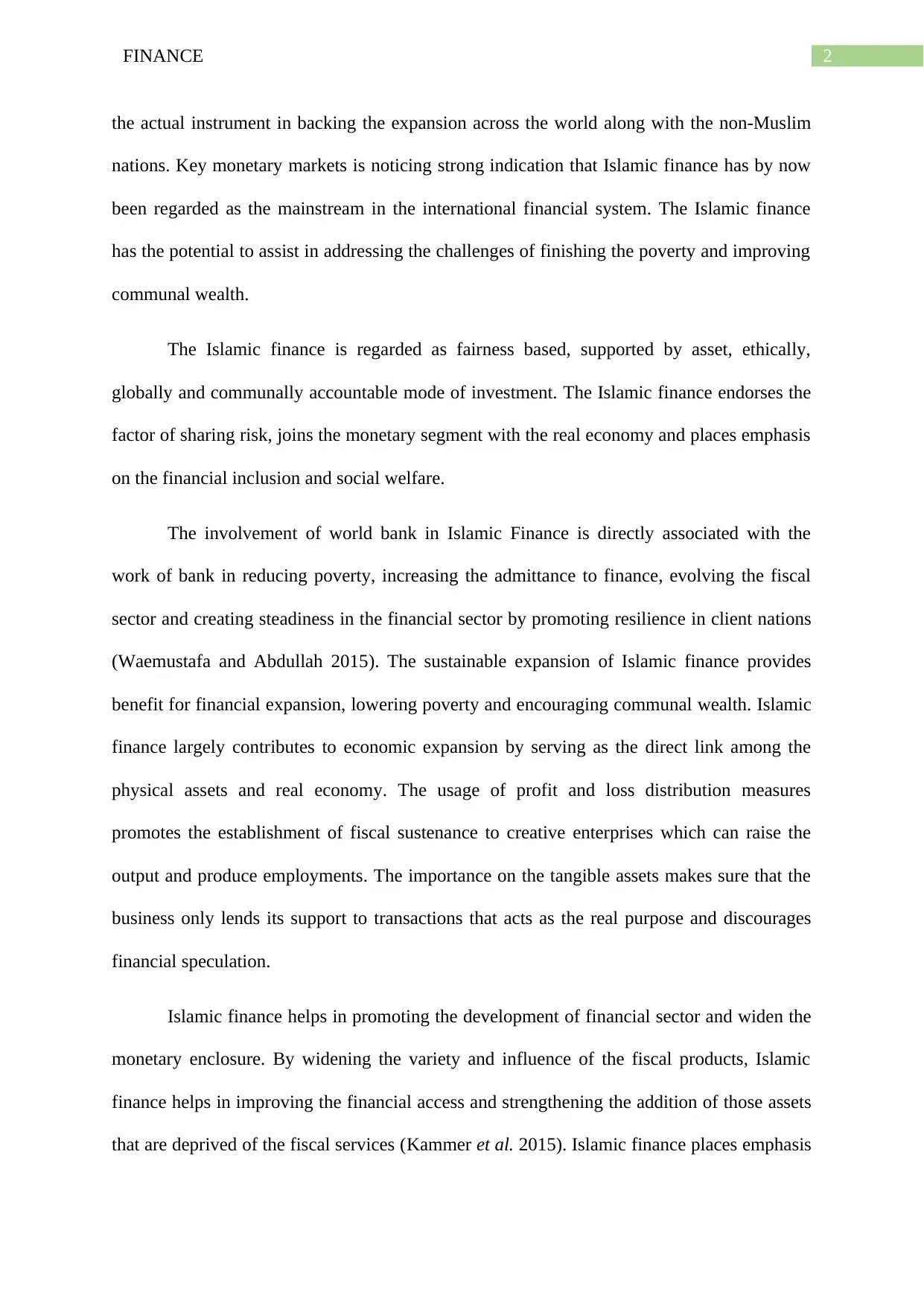
2FINANCE
the actual instrument in backing the expansion across the world along with the non-Muslim
nations. Key monetary markets is noticing strong indication that Islamic finance has by now
been regarded as the mainstream in the international financial system. The Islamic finance
has the potential to assist in addressing the challenges of finishing the poverty and improving
communal wealth.
The Islamic finance is regarded as fairness based, supported by asset, ethically,
globally and communally accountable mode of investment. The Islamic finance endorses the
factor of sharing risk, joins the monetary segment with the real economy and places emphasis
on the financial inclusion and social welfare.
The involvement of world bank in Islamic Finance is directly associated with the
work of bank in reducing poverty, increasing the admittance to finance, evolving the fiscal
sector and creating steadiness in the financial sector by promoting resilience in client nations
(Waemustafa and Abdullah 2015). The sustainable expansion of Islamic finance provides
benefit for financial expansion, lowering poverty and encouraging communal wealth. Islamic
finance largely contributes to economic expansion by serving as the direct link among the
physical assets and real economy. The usage of profit and loss distribution measures
promotes the establishment of fiscal sustenance to creative enterprises which can raise the
output and produce employments. The importance on the tangible assets makes sure that the
business only lends its support to transactions that acts as the real purpose and discourages
financial speculation.
Islamic finance helps in promoting the development of financial sector and widen the
monetary enclosure. By widening the variety and influence of the fiscal products, Islamic
finance helps in improving the financial access and strengthening the addition of those assets
that are deprived of the fiscal services (Kammer et al. 2015). Islamic finance places emphasis
the actual instrument in backing the expansion across the world along with the non-Muslim
nations. Key monetary markets is noticing strong indication that Islamic finance has by now
been regarded as the mainstream in the international financial system. The Islamic finance
has the potential to assist in addressing the challenges of finishing the poverty and improving
communal wealth.
The Islamic finance is regarded as fairness based, supported by asset, ethically,
globally and communally accountable mode of investment. The Islamic finance endorses the
factor of sharing risk, joins the monetary segment with the real economy and places emphasis
on the financial inclusion and social welfare.
The involvement of world bank in Islamic Finance is directly associated with the
work of bank in reducing poverty, increasing the admittance to finance, evolving the fiscal
sector and creating steadiness in the financial sector by promoting resilience in client nations
(Waemustafa and Abdullah 2015). The sustainable expansion of Islamic finance provides
benefit for financial expansion, lowering poverty and encouraging communal wealth. Islamic
finance largely contributes to economic expansion by serving as the direct link among the
physical assets and real economy. The usage of profit and loss distribution measures
promotes the establishment of fiscal sustenance to creative enterprises which can raise the
output and produce employments. The importance on the tangible assets makes sure that the
business only lends its support to transactions that acts as the real purpose and discourages
financial speculation.
Islamic finance helps in promoting the development of financial sector and widen the
monetary enclosure. By widening the variety and influence of the fiscal products, Islamic
finance helps in improving the financial access and strengthening the addition of those assets
that are deprived of the fiscal services (Kammer et al. 2015). Islamic finance places emphasis
⊘ This is a preview!⊘
Do you want full access?
Subscribe today to unlock all pages.

Trusted by 1+ million students worldwide
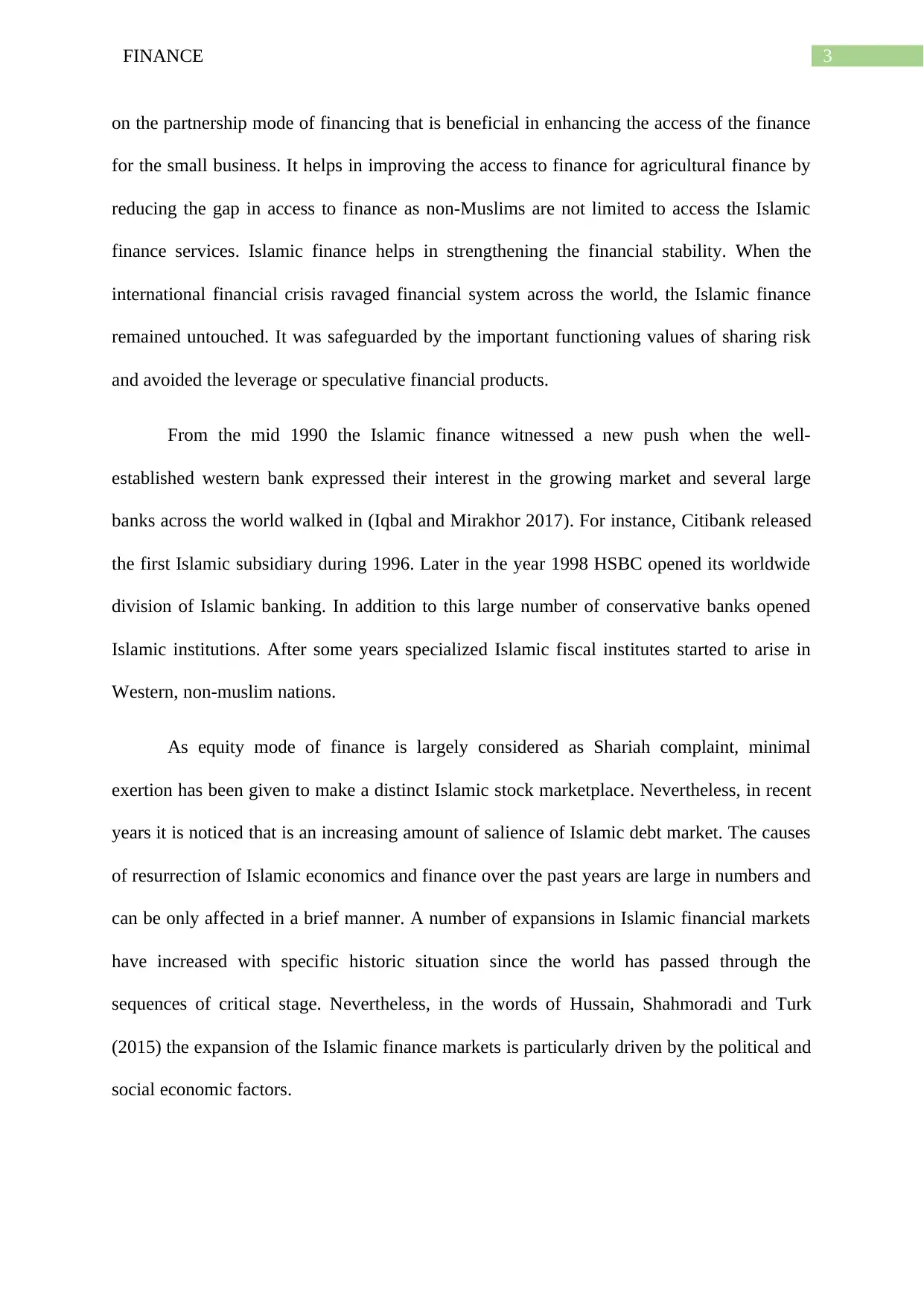
3FINANCE
on the partnership mode of financing that is beneficial in enhancing the access of the finance
for the small business. It helps in improving the access to finance for agricultural finance by
reducing the gap in access to finance as non-Muslims are not limited to access the Islamic
finance services. Islamic finance helps in strengthening the financial stability. When the
international financial crisis ravaged financial system across the world, the Islamic finance
remained untouched. It was safeguarded by the important functioning values of sharing risk
and avoided the leverage or speculative financial products.
From the mid 1990 the Islamic finance witnessed a new push when the well-
established western bank expressed their interest in the growing market and several large
banks across the world walked in (Iqbal and Mirakhor 2017). For instance, Citibank released
the first Islamic subsidiary during 1996. Later in the year 1998 HSBC opened its worldwide
division of Islamic banking. In addition to this large number of conservative banks opened
Islamic institutions. After some years specialized Islamic fiscal institutes started to arise in
Western, non-muslim nations.
As equity mode of finance is largely considered as Shariah complaint, minimal
exertion has been given to make a distinct Islamic stock marketplace. Nevertheless, in recent
years it is noticed that is an increasing amount of salience of Islamic debt market. The causes
of resurrection of Islamic economics and finance over the past years are large in numbers and
can be only affected in a brief manner. A number of expansions in Islamic financial markets
have increased with specific historic situation since the world has passed through the
sequences of critical stage. Nevertheless, in the words of Hussain, Shahmoradi and Turk
(2015) the expansion of the Islamic finance markets is particularly driven by the political and
social economic factors.
on the partnership mode of financing that is beneficial in enhancing the access of the finance
for the small business. It helps in improving the access to finance for agricultural finance by
reducing the gap in access to finance as non-Muslims are not limited to access the Islamic
finance services. Islamic finance helps in strengthening the financial stability. When the
international financial crisis ravaged financial system across the world, the Islamic finance
remained untouched. It was safeguarded by the important functioning values of sharing risk
and avoided the leverage or speculative financial products.
From the mid 1990 the Islamic finance witnessed a new push when the well-
established western bank expressed their interest in the growing market and several large
banks across the world walked in (Iqbal and Mirakhor 2017). For instance, Citibank released
the first Islamic subsidiary during 1996. Later in the year 1998 HSBC opened its worldwide
division of Islamic banking. In addition to this large number of conservative banks opened
Islamic institutions. After some years specialized Islamic fiscal institutes started to arise in
Western, non-muslim nations.
As equity mode of finance is largely considered as Shariah complaint, minimal
exertion has been given to make a distinct Islamic stock marketplace. Nevertheless, in recent
years it is noticed that is an increasing amount of salience of Islamic debt market. The causes
of resurrection of Islamic economics and finance over the past years are large in numbers and
can be only affected in a brief manner. A number of expansions in Islamic financial markets
have increased with specific historic situation since the world has passed through the
sequences of critical stage. Nevertheless, in the words of Hussain, Shahmoradi and Turk
(2015) the expansion of the Islamic finance markets is particularly driven by the political and
social economic factors.
Paraphrase This Document
Need a fresh take? Get an instant paraphrase of this document with our AI Paraphraser
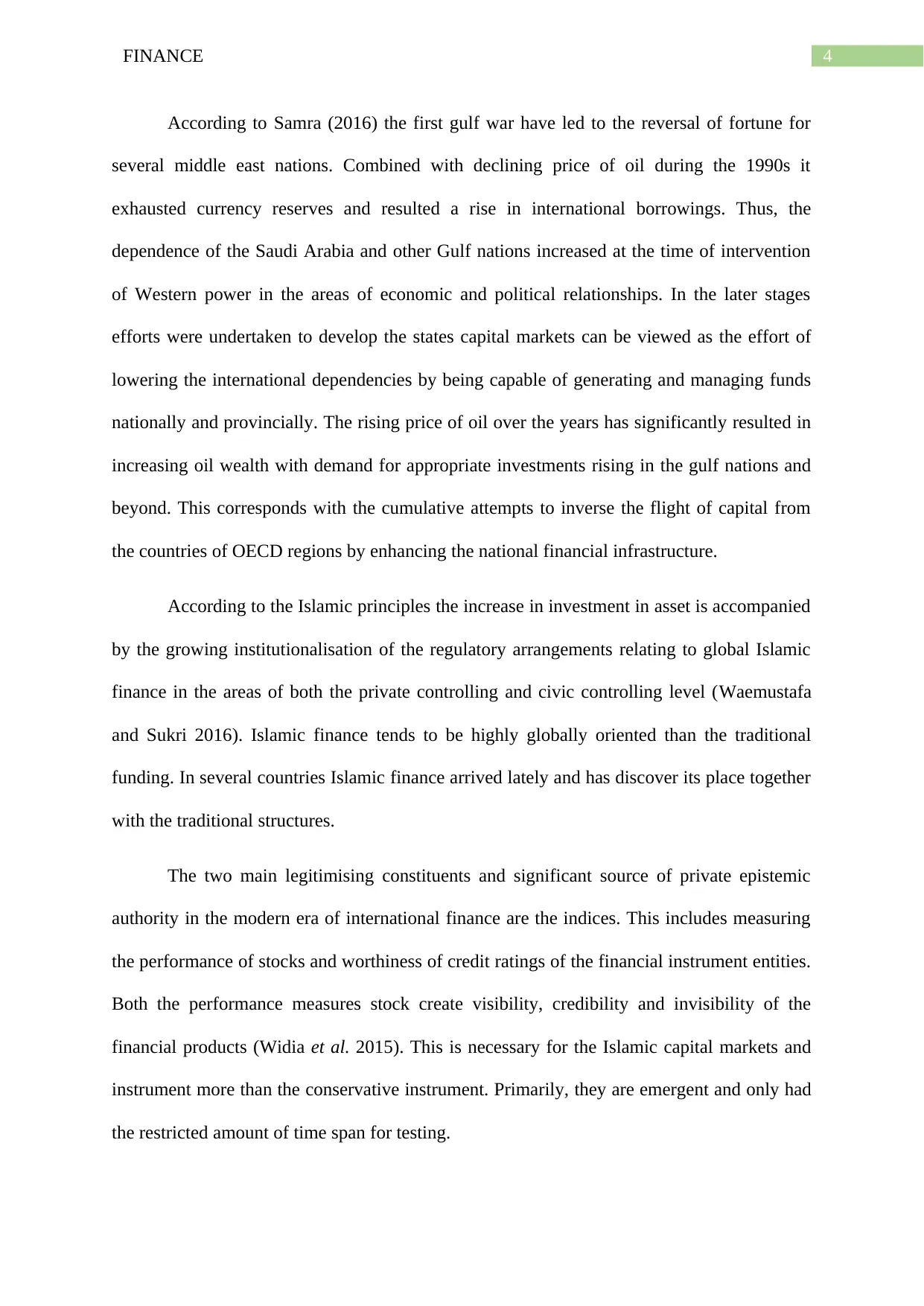
4FINANCE
According to Samra (2016) the first gulf war have led to the reversal of fortune for
several middle east nations. Combined with declining price of oil during the 1990s it
exhausted currency reserves and resulted a rise in international borrowings. Thus, the
dependence of the Saudi Arabia and other Gulf nations increased at the time of intervention
of Western power in the areas of economic and political relationships. In the later stages
efforts were undertaken to develop the states capital markets can be viewed as the effort of
lowering the international dependencies by being capable of generating and managing funds
nationally and provincially. The rising price of oil over the years has significantly resulted in
increasing oil wealth with demand for appropriate investments rising in the gulf nations and
beyond. This corresponds with the cumulative attempts to inverse the flight of capital from
the countries of OECD regions by enhancing the national financial infrastructure.
According to the Islamic principles the increase in investment in asset is accompanied
by the growing institutionalisation of the regulatory arrangements relating to global Islamic
finance in the areas of both the private controlling and civic controlling level (Waemustafa
and Sukri 2016). Islamic finance tends to be highly globally oriented than the traditional
funding. In several countries Islamic finance arrived lately and has discover its place together
with the traditional structures.
The two main legitimising constituents and significant source of private epistemic
authority in the modern era of international finance are the indices. This includes measuring
the performance of stocks and worthiness of credit ratings of the financial instrument entities.
Both the performance measures stock create visibility, credibility and invisibility of the
financial products (Widia et al. 2015). This is necessary for the Islamic capital markets and
instrument more than the conservative instrument. Primarily, they are emergent and only had
the restricted amount of time span for testing.
According to Samra (2016) the first gulf war have led to the reversal of fortune for
several middle east nations. Combined with declining price of oil during the 1990s it
exhausted currency reserves and resulted a rise in international borrowings. Thus, the
dependence of the Saudi Arabia and other Gulf nations increased at the time of intervention
of Western power in the areas of economic and political relationships. In the later stages
efforts were undertaken to develop the states capital markets can be viewed as the effort of
lowering the international dependencies by being capable of generating and managing funds
nationally and provincially. The rising price of oil over the years has significantly resulted in
increasing oil wealth with demand for appropriate investments rising in the gulf nations and
beyond. This corresponds with the cumulative attempts to inverse the flight of capital from
the countries of OECD regions by enhancing the national financial infrastructure.
According to the Islamic principles the increase in investment in asset is accompanied
by the growing institutionalisation of the regulatory arrangements relating to global Islamic
finance in the areas of both the private controlling and civic controlling level (Waemustafa
and Sukri 2016). Islamic finance tends to be highly globally oriented than the traditional
funding. In several countries Islamic finance arrived lately and has discover its place together
with the traditional structures.
The two main legitimising constituents and significant source of private epistemic
authority in the modern era of international finance are the indices. This includes measuring
the performance of stocks and worthiness of credit ratings of the financial instrument entities.
Both the performance measures stock create visibility, credibility and invisibility of the
financial products (Widia et al. 2015). This is necessary for the Islamic capital markets and
instrument more than the conservative instrument. Primarily, they are emergent and only had
the restricted amount of time span for testing.
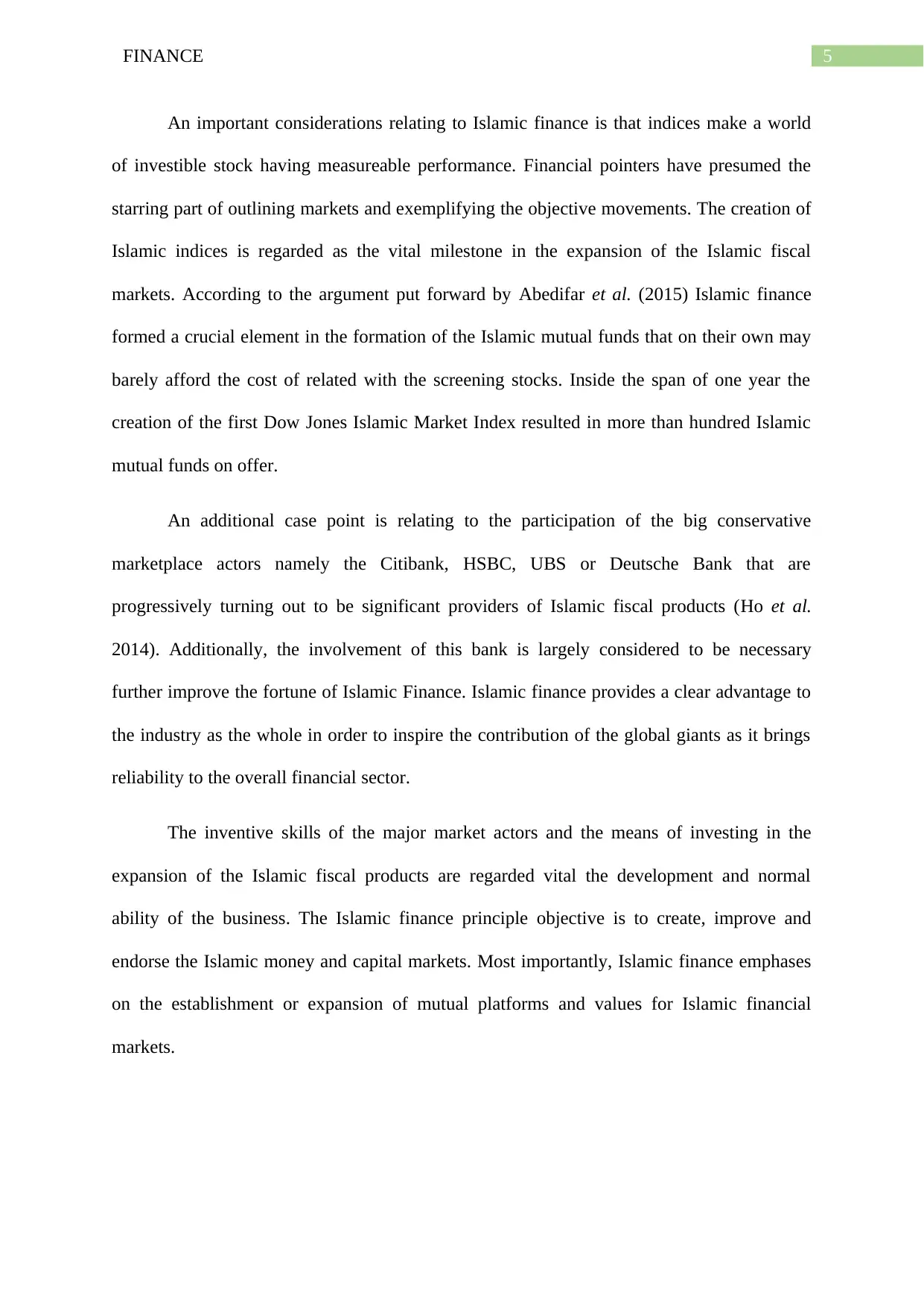
5FINANCE
An important considerations relating to Islamic finance is that indices make a world
of investible stock having measureable performance. Financial pointers have presumed the
starring part of outlining markets and exemplifying the objective movements. The creation of
Islamic indices is regarded as the vital milestone in the expansion of the Islamic fiscal
markets. According to the argument put forward by Abedifar et al. (2015) Islamic finance
formed a crucial element in the formation of the Islamic mutual funds that on their own may
barely afford the cost of related with the screening stocks. Inside the span of one year the
creation of the first Dow Jones Islamic Market Index resulted in more than hundred Islamic
mutual funds on offer.
An additional case point is relating to the participation of the big conservative
marketplace actors namely the Citibank, HSBC, UBS or Deutsche Bank that are
progressively turning out to be significant providers of Islamic fiscal products (Ho et al.
2014). Additionally, the involvement of this bank is largely considered to be necessary
further improve the fortune of Islamic Finance. Islamic finance provides a clear advantage to
the industry as the whole in order to inspire the contribution of the global giants as it brings
reliability to the overall financial sector.
The inventive skills of the major market actors and the means of investing in the
expansion of the Islamic fiscal products are regarded vital the development and normal
ability of the business. The Islamic finance principle objective is to create, improve and
endorse the Islamic money and capital markets. Most importantly, Islamic finance emphases
on the establishment or expansion of mutual platforms and values for Islamic financial
markets.
An important considerations relating to Islamic finance is that indices make a world
of investible stock having measureable performance. Financial pointers have presumed the
starring part of outlining markets and exemplifying the objective movements. The creation of
Islamic indices is regarded as the vital milestone in the expansion of the Islamic fiscal
markets. According to the argument put forward by Abedifar et al. (2015) Islamic finance
formed a crucial element in the formation of the Islamic mutual funds that on their own may
barely afford the cost of related with the screening stocks. Inside the span of one year the
creation of the first Dow Jones Islamic Market Index resulted in more than hundred Islamic
mutual funds on offer.
An additional case point is relating to the participation of the big conservative
marketplace actors namely the Citibank, HSBC, UBS or Deutsche Bank that are
progressively turning out to be significant providers of Islamic fiscal products (Ho et al.
2014). Additionally, the involvement of this bank is largely considered to be necessary
further improve the fortune of Islamic Finance. Islamic finance provides a clear advantage to
the industry as the whole in order to inspire the contribution of the global giants as it brings
reliability to the overall financial sector.
The inventive skills of the major market actors and the means of investing in the
expansion of the Islamic fiscal products are regarded vital the development and normal
ability of the business. The Islamic finance principle objective is to create, improve and
endorse the Islamic money and capital markets. Most importantly, Islamic finance emphases
on the establishment or expansion of mutual platforms and values for Islamic financial
markets.
⊘ This is a preview!⊘
Do you want full access?
Subscribe today to unlock all pages.

Trusted by 1+ million students worldwide
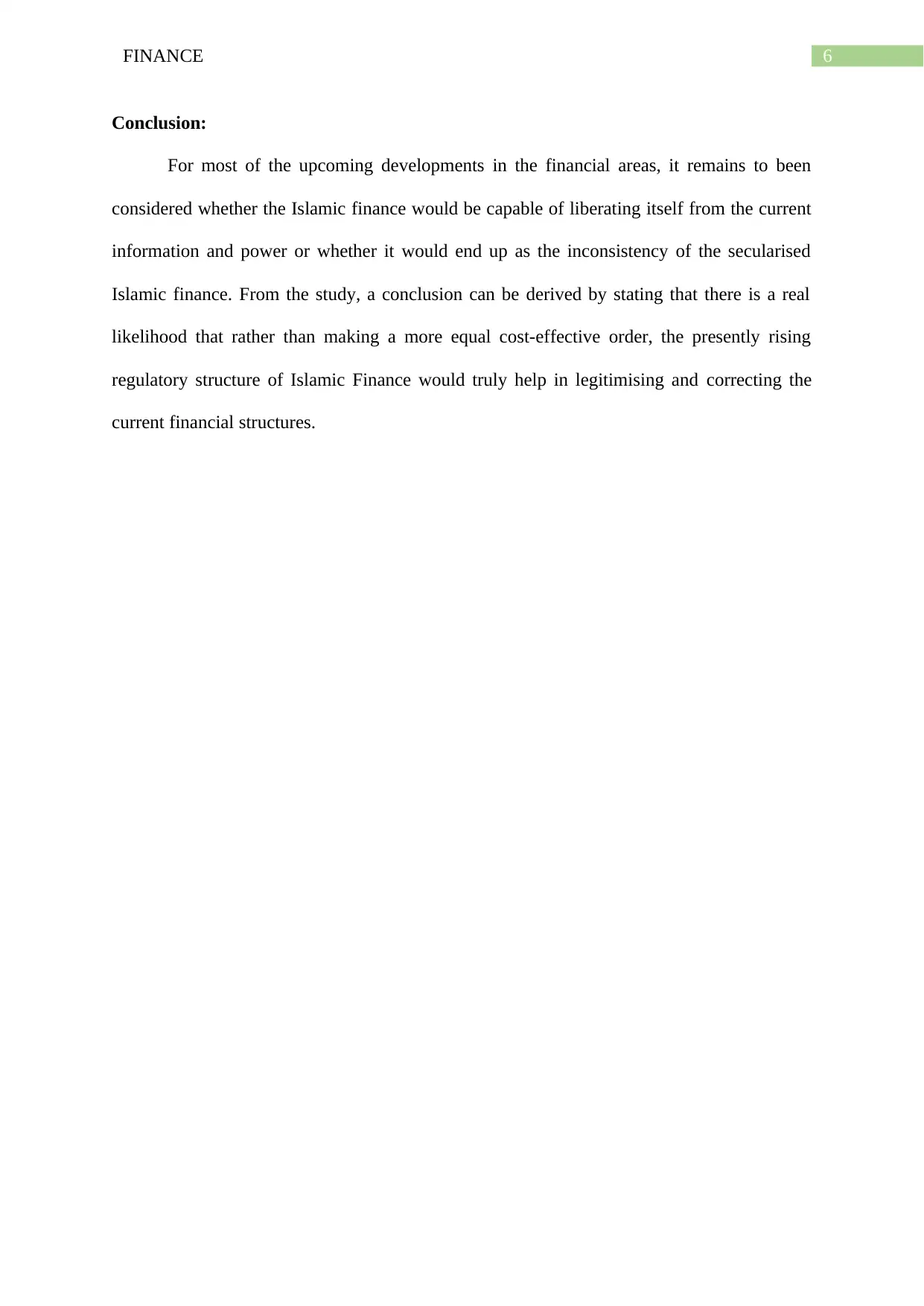
6FINANCE
Conclusion:
For most of the upcoming developments in the financial areas, it remains to been
considered whether the Islamic finance would be capable of liberating itself from the current
information and power or whether it would end up as the inconsistency of the secularised
Islamic finance. From the study, a conclusion can be derived by stating that there is a real
likelihood that rather than making a more equal cost-effective order, the presently rising
regulatory structure of Islamic Finance would truly help in legitimising and correcting the
current financial structures.
Conclusion:
For most of the upcoming developments in the financial areas, it remains to been
considered whether the Islamic finance would be capable of liberating itself from the current
information and power or whether it would end up as the inconsistency of the secularised
Islamic finance. From the study, a conclusion can be derived by stating that there is a real
likelihood that rather than making a more equal cost-effective order, the presently rising
regulatory structure of Islamic Finance would truly help in legitimising and correcting the
current financial structures.
Paraphrase This Document
Need a fresh take? Get an instant paraphrase of this document with our AI Paraphraser
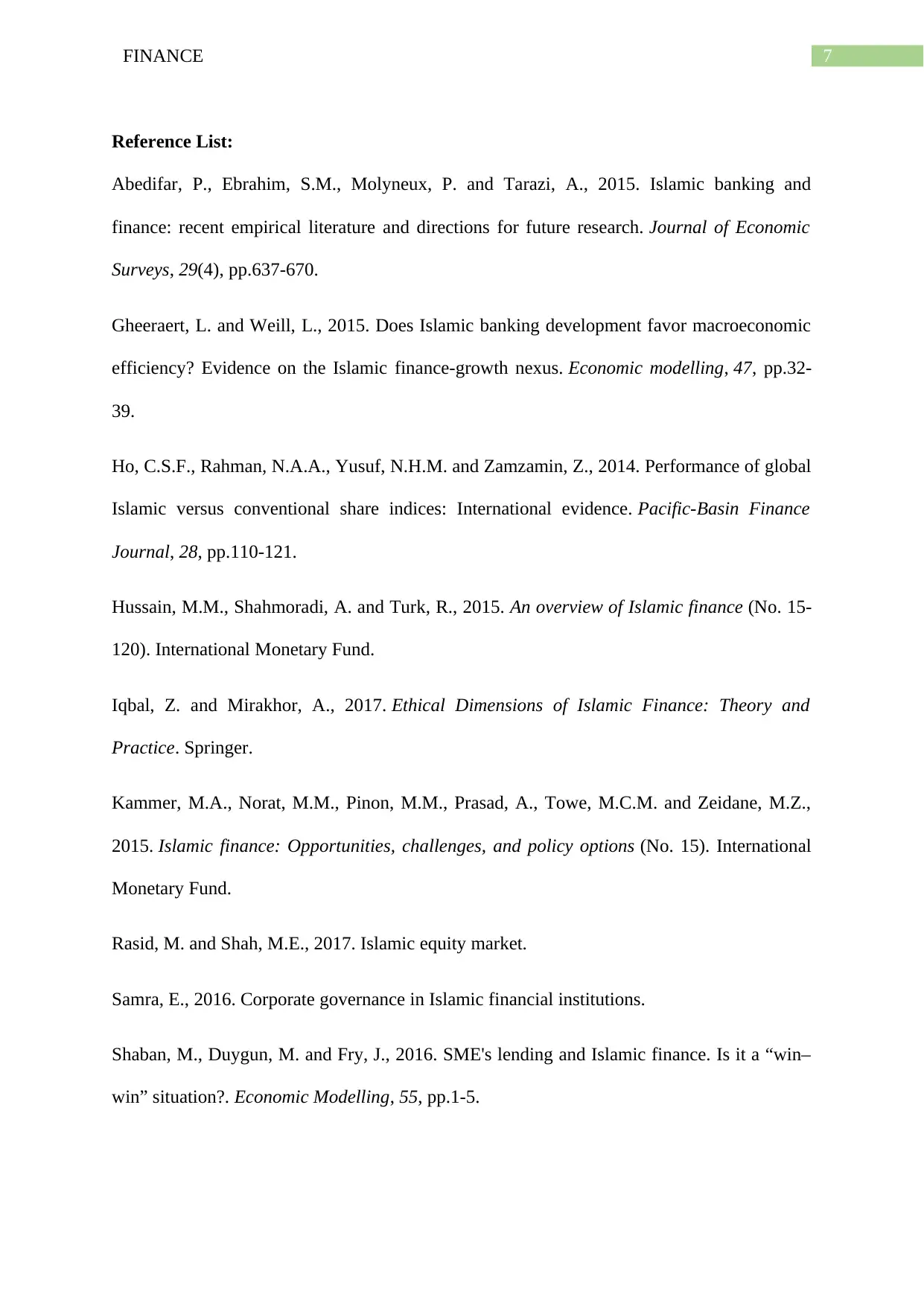
7FINANCE
Reference List:
Abedifar, P., Ebrahim, S.M., Molyneux, P. and Tarazi, A., 2015. Islamic banking and
finance: recent empirical literature and directions for future research. Journal of Economic
Surveys, 29(4), pp.637-670.
Gheeraert, L. and Weill, L., 2015. Does Islamic banking development favor macroeconomic
efficiency? Evidence on the Islamic finance-growth nexus. Economic modelling, 47, pp.32-
39.
Ho, C.S.F., Rahman, N.A.A., Yusuf, N.H.M. and Zamzamin, Z., 2014. Performance of global
Islamic versus conventional share indices: International evidence. Pacific-Basin Finance
Journal, 28, pp.110-121.
Hussain, M.M., Shahmoradi, A. and Turk, R., 2015. An overview of Islamic finance (No. 15-
120). International Monetary Fund.
Iqbal, Z. and Mirakhor, A., 2017. Ethical Dimensions of Islamic Finance: Theory and
Practice. Springer.
Kammer, M.A., Norat, M.M., Pinon, M.M., Prasad, A., Towe, M.C.M. and Zeidane, M.Z.,
2015. Islamic finance: Opportunities, challenges, and policy options (No. 15). International
Monetary Fund.
Rasid, M. and Shah, M.E., 2017. Islamic equity market.
Samra, E., 2016. Corporate governance in Islamic financial institutions.
Shaban, M., Duygun, M. and Fry, J., 2016. SME's lending and Islamic finance. Is it a “win–
win” situation?. Economic Modelling, 55, pp.1-5.
Reference List:
Abedifar, P., Ebrahim, S.M., Molyneux, P. and Tarazi, A., 2015. Islamic banking and
finance: recent empirical literature and directions for future research. Journal of Economic
Surveys, 29(4), pp.637-670.
Gheeraert, L. and Weill, L., 2015. Does Islamic banking development favor macroeconomic
efficiency? Evidence on the Islamic finance-growth nexus. Economic modelling, 47, pp.32-
39.
Ho, C.S.F., Rahman, N.A.A., Yusuf, N.H.M. and Zamzamin, Z., 2014. Performance of global
Islamic versus conventional share indices: International evidence. Pacific-Basin Finance
Journal, 28, pp.110-121.
Hussain, M.M., Shahmoradi, A. and Turk, R., 2015. An overview of Islamic finance (No. 15-
120). International Monetary Fund.
Iqbal, Z. and Mirakhor, A., 2017. Ethical Dimensions of Islamic Finance: Theory and
Practice. Springer.
Kammer, M.A., Norat, M.M., Pinon, M.M., Prasad, A., Towe, M.C.M. and Zeidane, M.Z.,
2015. Islamic finance: Opportunities, challenges, and policy options (No. 15). International
Monetary Fund.
Rasid, M. and Shah, M.E., 2017. Islamic equity market.
Samra, E., 2016. Corporate governance in Islamic financial institutions.
Shaban, M., Duygun, M. and Fry, J., 2016. SME's lending and Islamic finance. Is it a “win–
win” situation?. Economic Modelling, 55, pp.1-5.
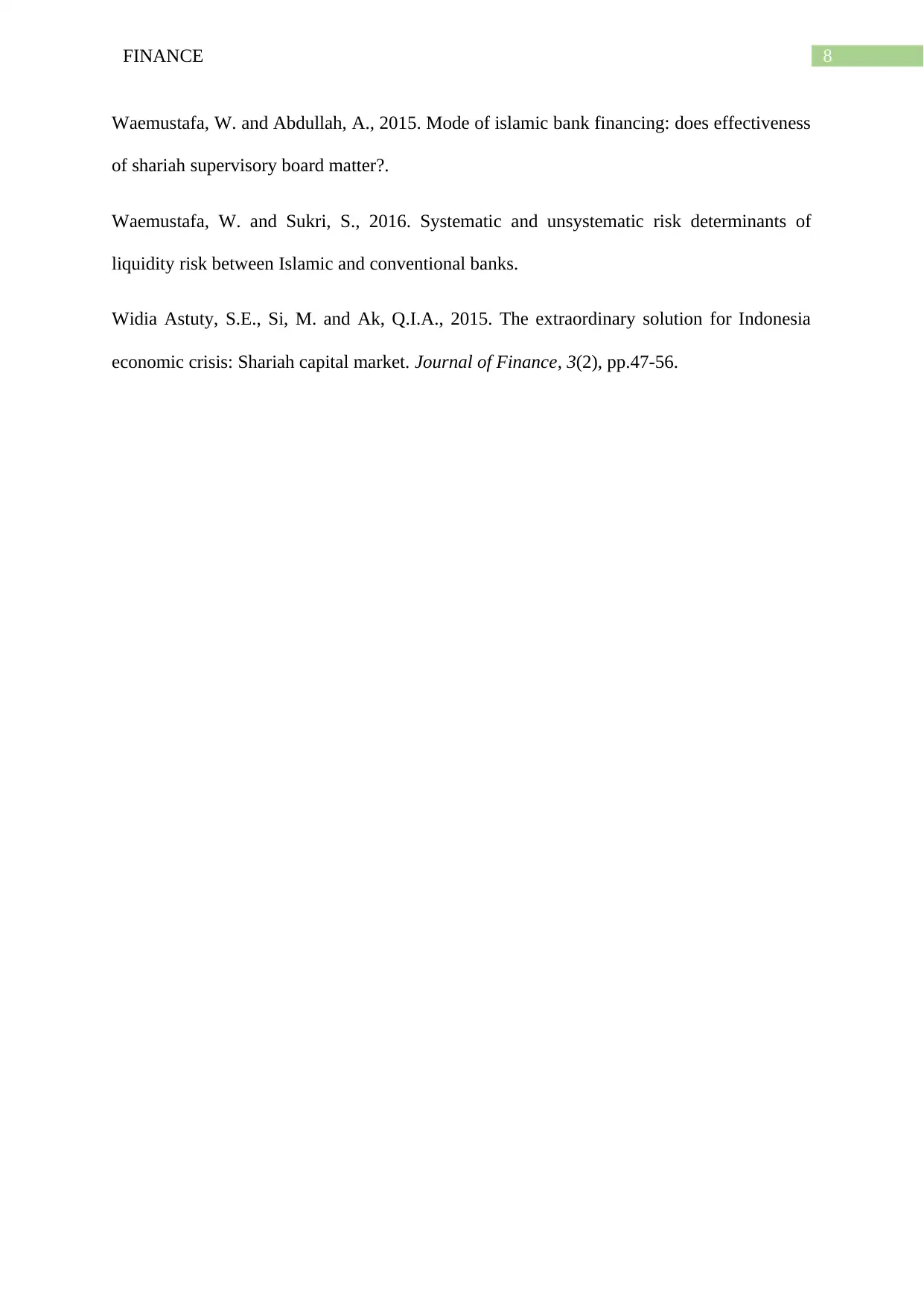
8FINANCE
Waemustafa, W. and Abdullah, A., 2015. Mode of islamic bank financing: does effectiveness
of shariah supervisory board matter?.
Waemustafa, W. and Sukri, S., 2016. Systematic and unsystematic risk determinants of
liquidity risk between Islamic and conventional banks.
Widia Astuty, S.E., Si, M. and Ak, Q.I.A., 2015. The extraordinary solution for Indonesia
economic crisis: Shariah capital market. Journal of Finance, 3(2), pp.47-56.
Waemustafa, W. and Abdullah, A., 2015. Mode of islamic bank financing: does effectiveness
of shariah supervisory board matter?.
Waemustafa, W. and Sukri, S., 2016. Systematic and unsystematic risk determinants of
liquidity risk between Islamic and conventional banks.
Widia Astuty, S.E., Si, M. and Ak, Q.I.A., 2015. The extraordinary solution for Indonesia
economic crisis: Shariah capital market. Journal of Finance, 3(2), pp.47-56.
⊘ This is a preview!⊘
Do you want full access?
Subscribe today to unlock all pages.

Trusted by 1+ million students worldwide
1 out of 9
Related Documents
Your All-in-One AI-Powered Toolkit for Academic Success.
+13062052269
info@desklib.com
Available 24*7 on WhatsApp / Email
![[object Object]](/_next/static/media/star-bottom.7253800d.svg)
Unlock your academic potential
Copyright © 2020–2026 A2Z Services. All Rights Reserved. Developed and managed by ZUCOL.




